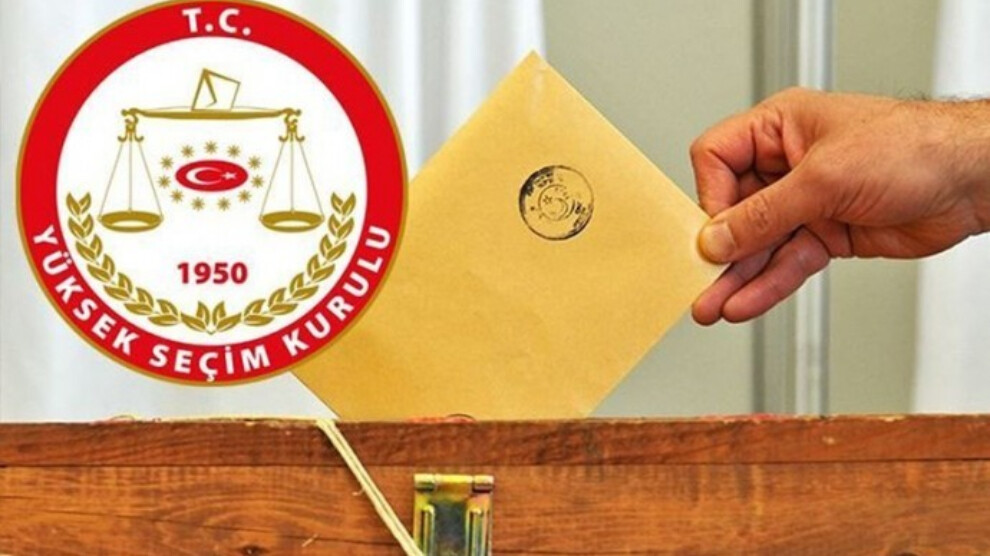36 parties to run in Turkey’s elections in May
The Supreme Election Board (YSK) has announced the list of 36 political parties eligible to run in the upcoming elections in May.
The Supreme Election Board (YSK) has announced the list of 36 political parties eligible to run in the upcoming elections in May.

Signing a decision on Friday, Turkish President Erdogan said that the country’s parliamentary and presidential elections would be held on May 14. Later in the day, the decision was published in the Official Gazette, and approved by the Supreme Election Board (YSK).
YSK announced the list of 36 political parties eligible to run in the presidential and parliamentary elections as follows:
Adalet Birlik Partisi (Justice and Unity Party)
Adalet Partisi (Justice Party)
Adalet ve Kalkınma Partisi (Justice and Development Party)
Anavatan Partisi (Motherland Party)
Bağımsız Türkiye Partisi (Independent Turkey Party)
Büyük Birlik Partisi (Great Unity Party)
Büyük Türkiye Partisi (Great Turkey Party)
Cumhuriyet Halk Partisi (Republican People’s Party)
Demokrasi ve Atılım Partisi (Democracy and Progress Party)
Demokratik Sol Parti (Democratic Left Party)
Demokrat Parti (Democrat Party)
Emek Partisi (Labour Party)
Gelecek Partisi (Future Party)
Genç Parti (Young Party)
Güç Birliği Partisi (Power Union Party)
Hak ve Özgürlükler Partisi (Rights and Freedoms Party)
Halkın Kurtuluş Partisi (People’s Liberation Party)
Halkların Demokratik Partisi (Peoples’ Democratic Party)
Hür Dava Partisi (Free Cause Party)
İYİ Parti (Good Party)
Memleket Partisi (Homeland Party)
Millet Partisi (Nation Party)
Milliyetçi Hareket Partisi (Nationalist Movement Party)
Milli Yol Partisi (National Path Party)
Saadet Partisi (Felicity Party)
Sol Parti (Left Party)
Türkiye Değişim Partisi (Party for a Change in Turkey)
Türkiye İşçi Partisi (Workers’ Party of Turkey)
Türkiye Komünist Hareketi (Communist Movement of Turkey)
Türkiye Komünist Partisi Communist Party of Turkey)
Vatan Partisi (Patriotic Party)
Yeniden Refah Partisi (New Welfare Party)
Yenilik Partisi (Innovation Party)
Yeni Türkiye Partisi (New Turkey Party)
Yeşiller ve Sol Gelecek Partisi (Greens and Left Future Party)
Zafer Partisi (Victory Party)
If the president is not elected in the first round, the second round will take place on May 28.
Erdogan is seeking another term in office in the election. According to the constitution, however, he would not be allowed to run for the presidency again. Section 101 of the Turkish constitution sets a maximum limit of two terms for the president. Because Erdogan was already elected president in 2014 and confirmed in office in 2018, the opposition parties argue that this is the end for the AKP politician.
Erdogan rejects the objections. He argues that with the new constitution of 2018, the count starts all over again, and that nothing constitutionally stands in the way of his running for another five-year term. Erdogan was prime minister from 2003 before becoming president in 2014. In 2017, he introduced a presidential system by constitutional referendum and established a one-man regime.
According to polls, Erdogan must fear for his re-election this time. The autocratic long-term ruler has been criticised for the lack of a crisis management plan after the devastating earthquakes on February 6, which left tens of thousands dead and thousands injured.